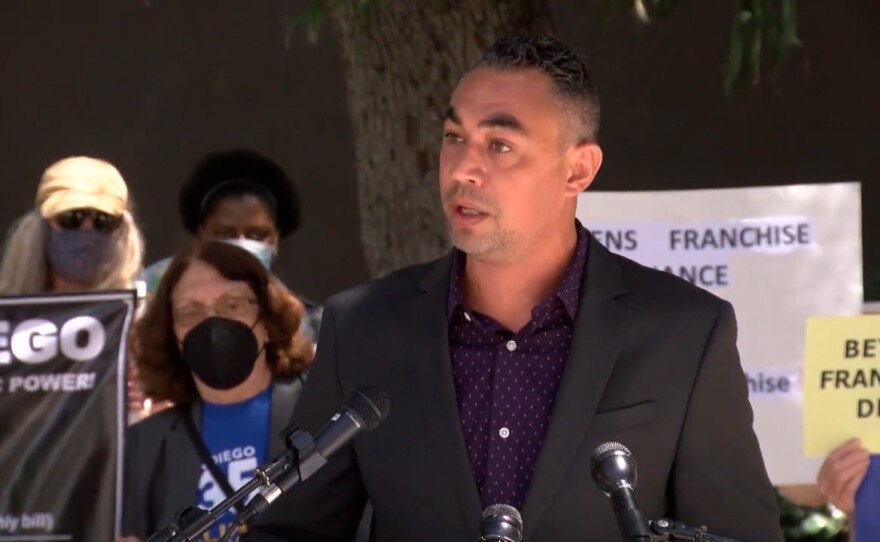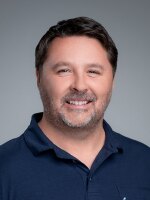Speaker 1: (00:00)
Last Monday, the San Diego city council voted Sean ELO Rivera as its new president. After the now former council president, Dr. Jen Campbell was unable to get the votes needed to remain in the role. E Rivera represents San Diego's ninth district, which encompasses area such as city Heights, the college area, and down to south Krest. Here's what council president ELO river had to say just after his rather surprising election. Last week,
Speaker 2: (00:24)
We have a lot to do obviously, but I really do truly believe that, um, we have the ability as a city and the capacity as a council to, um, exert our strength and our ability in such a way that we can, um, move to a better place.
Speaker 1: (00:40)
Jade Hyman and spoke with council, president ELO Rivera about his vision for the council as he settles into his new role
Speaker 3: (00:46)
Council, president ELO Rivera. Welcome.
Speaker 2: (00:49)
Thank you for having me on
Speaker 3: (00:50)
How will city council be different with you as president,
Speaker 2: (00:53)
Rather than thinking about different. It's just kind of thinking toward the future and knowing that I see us as, as having the potential of being a really strong council that is transparent to the community, that's collaborative with one another and makes well-informed responsible decisions that leads to the improvement of, of San Diego's lives.
Speaker 3: (01:14)
You joined the city council about a year ago, and now you are its president a seemingly fast rise. What drew you into Paula?
Speaker 2: (01:23)
It was a kind of a, a long and meandering track. My inspiration to, to pursue politics came when I was still coaching high school sports actually. But the Obama campaign in 2008 really resonated with me as someone with a multiethnic multi-religious family, the way that, uh, then's Senator Obama and eventual president Obama talked about, um, the future and hope was exactly what I wanted and needed to hear in that moment and inspired me to, to go and see what sort of impact I could have on the world and did some, some teaching abroad, uh, did some organizing and policy work, uh, in the nonprofit space then was eventually inspired to run for office by, you know, just realizing that was probably a way to increase the opportunity of having a positive impact on the community.
Speaker 3: (02:11)
San Diego city workers recently had a deadline of December 1st to be fully vaccinated as a condition of employment, but some particularly the police union have been resistant, uh, will the city lose workers as a result of this policy?
Speaker 2: (02:25)
I, I think time will tell as to whether or not we will actually lose workers for me. This was a, a really important step to take, to ensure public health and safety and to provide some certainty on the staffing side, uh, what we heard, uh, in the, in the materials, uh, for that item and what we've heard repeatedly from folks who work, um, in various city departments, including police, is that the lack of, of vaccinations has led to, you know, many missed days of work, um, to having to take protective measures, uh, in terms of having folks stay home. And there's a lot of uncertainty that's there. And so a lot of the conversation has been on who we will lose, but I think we're gaining quite a bit as well. And that is, is the certainty of knowing that we're gonna have a, a, a, a, a staff that because they are vaccinated one first and foremost is they are better suited to protect the health and safety of the community. And two are more likely to provide the dependable services that San Diego depend on
Speaker 3: (03:23)
The city made major strides in opening up the city to more construction in the form of accessory dwelling units or ADUs. But you've spoken about the need to modify some of those rules. What will the council be looking to change when it comes to ADUs in the coming year? The
Speaker 2: (03:39)
We've been in conversations with the mayor's office. We issued a memo, a memo to his, his office back in late summer. And, um, they responded right before Thanksgiving and, um, they, they heard some of what we, we recommended. Um, they are studying some of the other recommendations that we've made. And, um, look, I, I am fully supportive of the need to, to produce more housing. We have to, the data tells us that we just simply do not have enough homes, uh, to provide for the needs of, of San Diegos not just today, but, you know, certainly into the future. Um, and that, that accessory dwell units are an important way to create, um, relatively affordable, sustainable housing for folks. Uh, we also that there is, there can be some, uh, unintended consequences, and we wanna make sure that we are being mindful of, of those as policies are put into place, and we can tailor as we see fit in order to ensure that we both are making the progress that we need while also mitigating the negative impacts that might be there from, uh, you know, from a additional development on
Speaker 3: (04:42)
Friday, SANDAG approved its regional transportation plan, which, uh, passed largely along party lines with Democrats supporting it and Republicans against it. How confident are you that the plan will come to fruition?
Speaker 2: (04:55)
I'm confident that it needs to, um, our, our region is in desperate need of, of additional investment in, in a transportation system and a mobility system, uh, that works better for more people. Um, I, uh, I was proud to have that be the first meeting that I attended as a SANDAG board member by way of my role as council president. Um, I was super supportive and I think that the, the, the votes and support of the plan, uh, were one was because there were, was quite literally billions of dollars at risk. If the, if the SANDAG board did not take action and, you know, a demonstration of, you know, what responsible governance looks like alongside the, the vote and support, there were also, you know, a request for additional analysis of ways to fund the plan. Uh, but as a plan, it is, it is something that will move us into the future.
Speaker 2: (05:44)
One in an inspiring way that I think is consistent with, uh, the mayors, uh, often discussed and, and our shared desire to see us become a, a world class city. But two is essential. We know that in neighborhoods that I represent like city Heights, uh, and south crest and mountain view and mountain hope, and then other parts of our city and region that folks are locked out of opportunity because they do not have access to the quality and, and, and, and plentiful public transportation and mobility options that they need. And so, uh, we are going to be expanding opportunity by way of this plan. Um, we're gonna be doing it in a way that's sustainable and consistent with the climate action goals that we have to reach. And so I was really proud to be there. I'm very, very supportive of all those who cast a yes vote. I think it was a responsible thing to do. And, uh, something that we would be proud of once that plan is implemented.
Speaker 3: (06:34)
One part of that plan calls for a 2 cent per mile driving tax, which many mayors in the region have come out against, including San Diego mayor, Todd, Gloria, do you share the mayor's view on this? Are, are you against it as well?
Speaker 2: (06:47)
I think what the mayor, the issues the mayor raises were really important one. So I think I was frustrated to see that such a, a transformative plan that was going to do so much good that the public was distracted by conservative talking points, uh, to be quite honest, um, that was meant to distract from the content of the plan. There's a reason why folks focused on this one thing that was, you know, pretty speculative and, you know, arguably unlikely to come to fruition. It's because the content of what was in that plan, what is in that plan is so attractive to the public. Um, so, uh, I, I do share the, the concerns of being overly dependent on, on a form of funding that we don't know that will actually come to life. Uh, we obviously want to be cognizant of the impacts that a, a fee like that could have on cost of living, but that particular form of funding is so far down the road is so, um, is, is so speculative at this point in time.
Speaker 2: (07:42)
I really do think that any discussion of it is merely a distraction from, you know, trying to move us to a, to becoming a region that has world class public transportation that has world class public has world class mobility options that work for people, um, of all, um, income levels and, uh, for folks from throughout, uh, you know, whether it's it's urban, suburban, or even the rural areas of our city. And again, does this in a way that is essential to meeting the climate action goals that the Wes a region have to have to hit.
Speaker 3: (08:12)
And you are taking the helm of the city council during a pandemic in which we've seen a concerning erosion in the relay between elected officials and the public. I I'm thinking, especially of some of the, uh, San Diego county board meetings over the past several months. And I'm curious why you think that is and what can be done to improve that going forward.
Speaker 2: (08:33)
The why there, I think there's a lot of components to why the relationship is what it is between the public, um, and, and, and elected officials. I don't know that I can answer all of that in this, in the, the context of this interview, what I will say is that it, it does distress me. It, it, it bothers me to see that I do worry that there's folks who are playing a game of, of, of one, one upmanship to see who can go viral by saying the worst things on camera. And that's, that's concerning. That's never the way to create the public discourse needed to, uh, improve trust, to create good decision making, um, conditions. But I also will say that, you know, I think that we as elected officials to own the fact that we can do better to communicate with the public. Do I think that we will win everybody over by doing those things? No, I, I don't live in fantasy land, so we won't win everyone over, but I do think that we can win the trust of a lot of folks back if we continuously strive to be transparent and accountable and accessible and make sure that we're, you know, we're doing our absolute best to embody those values on a day to day basis.
Speaker 3: (09:38)
I've been speaking with San Diego city council, president Sean ELO Rivera. Thank you so much for joining us today.
Speaker 2: (09:44)
Thank you for having me on appreciate it.








